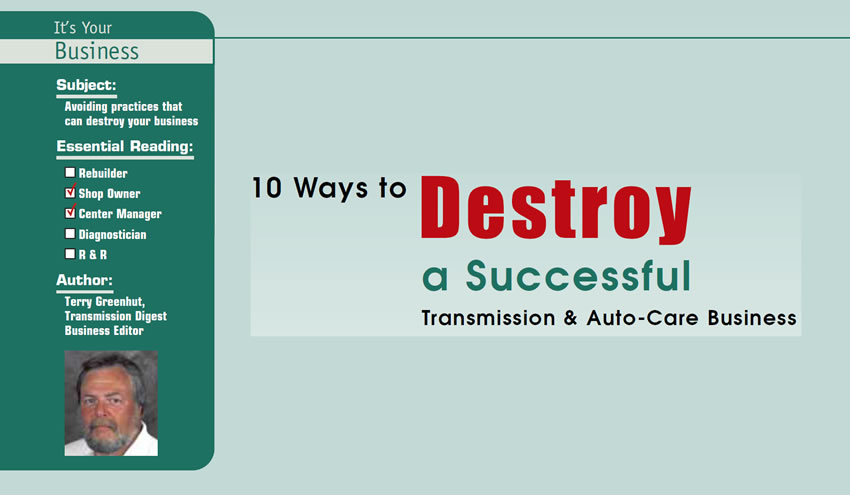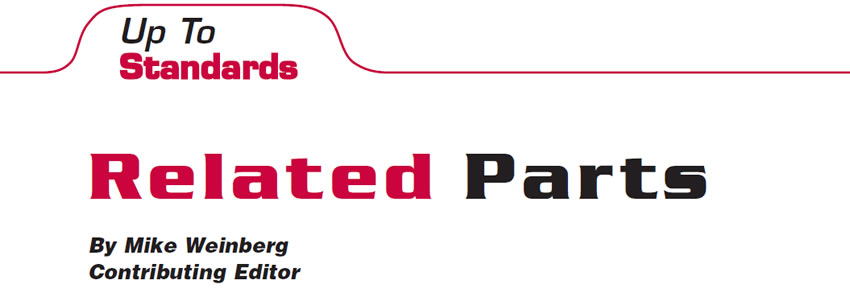
It’s Your Business
- Subject: Avoiding practices that can destroy your business
- Essential Reading: Shop Owner, Center Manager
- Author: Terry Greenhut, Transmission Digest Business Editor
Over the past couple of decades I have written articles designed to stimulate you into doing things that help your business to succeed. This time I want to tell you what not to do, because if you do any of the 10 things I have listed you will put your business in serious jeopardy.
Many of the points I mention deal with what you did to become successful in the first place, but complacency (a false sense of well-being) and entitlement (the “I’ve been here so many years now that I deserve to get all the business I want” syndrome) can lead you to undo all the hard work you put into attaining your present level of success.

So here they are – my top 10 ways to kill a business. Avoid them and you should be just fine.
One
Stop or cut way back on advertising. Heck, you don’t need it. You did in the beginning to get your business established, but now everyone in a 15-mile radius knows you, so why waste the money? I’m sure Budweiser and Coca Cola look at it the same way. Everyone knows those brands, so why do they increase their advertising budgets every year rather than decrease them? Do they like to throw money away, or do they know something you don’t?
They must know something. They spend big bucks on market research to find out where and how they should be placing their advertising dollars. If I were you I’d follow their lead by questioning customers and keeping my advertising not only out there but also fresh and innovative with special offers not only to the new customers I want to attract but also to my existing customer base.
Two
Forget about outside sales. There’s nobody out there to sell to, anyway. All the wholesale accounts are already spoken for and I know that all my existing accounts are loyal to me, so I don’t need to have anyone stop in to see them on any kind of a regular basis. Why should I pay somebody to do what I can do, anyway?
Taking this one apart one point at a time:
There are lots of companies out there to sell to. You may remember that outside sales was always about charming accounts away from other shops that already have them, so nothing has changed there. What has changed is that you have to make up your mind to deal with them a bit differently. They need more hand holding and more continuous attention so your competitor can’t come along and get his hooks into them.
As far as loyalty goes these days, they are loyal to the supplier who makes or saves them the most money and is most visible to them. If you don’t keep in constant touch, as soon as something goes wrong or they receive a better offer they will be gone.
Oh, yeah, and the part about why you should pay someone to go out there when you can do it? Because you won’t. You’ll find every excuse (true or imagined) but you won’t do it, first because you won’t discipline yourself to spend the time, and second because most owners just don’t want to go door knocking; they hated doing it in the beginning but knew they had to in order to build the business but later on believe it’s beneath them to be door-to-door salesmen.
Three
Sell everyone a transmission. That’s right, everyone; even the guy with 40,000 miles on the car who came in for only a service and had no other problem. Ready for this rationalization? The guy’s going to need one eventually, anyway; might as well sell it to him while you have the chance.
That would be like removing a 30-year-old’s healthy prostate gland because a high percentage of men develop prostate cancer as they get older. Keep selling people what they don’t need and you won’t have to wait to go out of business; some government agency will put you out. That’s assuming an irate customer doesn’t put your lights out permanently beforehand.
Four
Overcharge without justification. Sure, this is America, isn’t it? You can charge whatever you want.
Well, it doesn’t quite work that way. Even though the oil companies and the banks can get away with it because people need their products and their money so desperately, our industry can’t. We have to care about repeat customers and maintaining a good reputation, so we need to charge realistic amounts based truly on the parts and labor that go into a job. We can’t ever afford to lose an argument with a customer over a price we can’t justify. It kills our credibility.
Five
Stop spending so much on the good parts. The cheap ones will work just as well.
No, they won’t; not unless we all just woke up in some opposite universe. Comebacks can kill your business quicker than anything. It’s bad enough that there are many factors we can’t control, and we’re going to have our share of comebacks, but when we create them by trying to save a few dollars on a “no-name” overhaul kit or set of solenoids because we don’t have the nerve or the skill to ask the customer for the price we need, we put ourselves deeper and deeper in the hole. If we have to spend $300 and a couple of days trying to diagnose a problem we created, whom are we kidding? We could have bought 10 or 20 of the good kits for the money and never had the comeback in the first place.
Six
Quit wasting money on training. Your technicians know how to do everything by now, and your manager must know how to sell and keep customers happy. They’ve all been at it long enough.
Know how you can tell when a business is in serious trouble? They cut their training budget down to almost nothing. Training is the first thing to go, as if it were a luxury item. It’s a necessity, even more so when a business is not doing well. Doesn’t it make sense that when a business is in trouble it’s because someone or several people aren’t doing their jobs well? There are only two reasons for that: They don’t want to or they don’t know how.
When they don’t want to, you get rid of them and hire people who want to. When they don’t know how, you train them ’til they do. Here’s a news flash for you: 80% of the people answering telephones in our industry still don’t know how to talk a caller or price shopper in for diagnosis and then wonder why their shops don’t have any work. A fair percentage of rebuilders and general technicians can’t tell you why a system failed or, for that matter, what makes it work in the first place.
Of course, owners who won’t spend money to train managers or technicians think they have a valid excuse. “You train them and you lose them,” they like to say. Sure, you do if you don’t treat them right, but how in the world can you expect a business to stay afloat with untrained people? Yes, you will lose some people whom you treated very well and it will break your heart, but it’s all part of being in business. Pick yourself up, dust yourself off and train the next one.
I learned one of my best lessons 30 years ago from my partner, who had already been in the business for 35 years. He said, “Kid (he called me that because I was one at the time), this business is nothing but a revolving door. People come and go. Train them and get the most out of them while they’re with you. When it’s time for them to leave, replace them and do it again. The sooner you accept that, the happier you’ll be.”
It took me years to accept that. In fact, I don’t know whether I fully accept it today. I always want to find a way to salvage the relationship. Sometimes, more often than not, they just aren’t salvageable. You just have to let go and move on.
Seven
Hire cheaper help. You can probably get two mediocre technicians for what one good one would cost you. Of course, you’ll also get lots more comebacks and unhappy customers, not to mention less productivity and tons of excuses. But, hey, look at all the money you’ll save.
No, you won’t. In fact, that kind of economic decision can put you in the poorhouse. Technicians have to be so much sharper today. They have to love and study their trade. The best ones do, but they cost more. The good news is they can help you make more, because you can charge a premium when word gets out that you have specialists working in your business. Of course, you’re the one who has to get that word out in your promotion and advertising.
Eight
Don’t upgrade or buy new equipment. That old scan tool still works. Well, it doesn’t tell you everything you need to know and you have to mess with it for 20 minutes before it will give up any information, if it ever does; but, hey, a new one costs thousands, and by next year the manufacturers will probably change the standards and you’ll have to do it all over again.
The only problem with that logic is that you still have to do your business as the constant changes take place, and if you fall behind, catching up later becomes even more costly and difficult. Your shop needs to turn maximum productivity, and your customer needs to see that you run a technically qualified operation.
Nine
Make promises you can’t or won’t keep. Tell a customer his car will be ready by 5 o’clock when you have no idea whether it will be. Then when it isn’t, forget or don’t bother to call and say it won’t be ready. Here’s a better one: Give your customer a price and don’t stick to it. They love the thrill and surprise of coming to pick up the car and finding out that the bill is hundreds of dollars more than they were quoted. That’s a great story to tell their neighbor over the fence this weekend. It’s sure to make the whole community want to come and do business with you.
Ten
Don’t follow up to make sure your customers are happy with the work you did or the way they were treated. When you don’t hear anything negative, just assume that they are thrilled with the job you did and will be telling their friends how great your shop is.
That will be true about the same time pigs learn to fly. If you don’t follow up to make sure they are happy and if you don’t schedule them for the additional services they need, you won’t have much of a business left. Lack of follow-up to maintain customer loyalty and promote recurring business is the biggest single cause of failure in today’s business environment. Customers want to feel that the dollars they spend are appreciated, and with their busy lives they need to have someone looking after their automotive interests, and that’s you.
Take the position of “family auto-service adviser,” making sure that all their vehicles are cared for properly and on time. Set up maintenance schedules for each vehicle and make sure your customers are aware of them and are given the chance to follow them. Don’t wait for them to figure out that they need something done, because they won’t. Be one or two steps ahead of them. With the busy lives most people lead today, your offering this personalized service will make your shop stand out from all the rest. You need that edge, because consumers today see us as all being very much alike. You need to be as different from the competition as possible.
There’s an old saying: If you always do what you always did, then you’ll always get what you always got. That’s not true anymore. If you don’t do things that set you apart from all the others, people will have no reason to come to you. There are too many out there who look just like you. Keep doing the things that made you successful. Then think, “What more can I do to be different and better?”

Visit www.TerryGreenhut.com.





